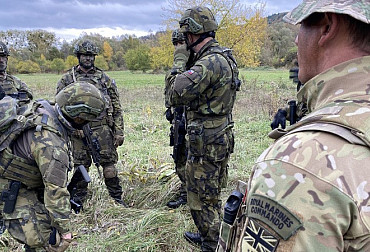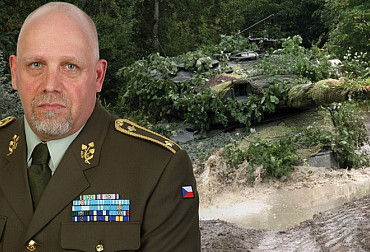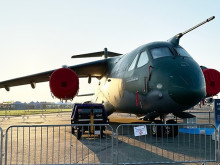The largest NATO exercise STEADFAST JUPITER 2023 was significantly attended by the soldiers of the Czech Armed Forces
The Czechs dominated in terms of numbers in the logistics unit (Joint Logistics Support Group Brunssum/JLSGBS HQ) during one of the largest NATO exercises - Steadfast Jupiter 2023. The HQ with its subordinate units under the command of a Czech general successfully completed a challenging 14-day exercise in Garlstedt, Germany, and was awarded Combat Ready status.
"Compared to the last exercise in 2021, a high percentage of servicemen and women from the Czech Armed Forces and Military Police also participated in this important and verification NATO exercise with more than 7,000 trainees. Within the JLSGBS we had the position of e.g. press and information officer, military policeman as the main security advisor to the commander, representatives of subordinate units, e.g. a member of the NFIU (NATO Force Integration Unit) from Slovakia and the largest number of DCM (Deployable Communication Module) members. Brigadier General and current Commander of the JLSG in Brunssum, David Schnábel, listed some of the positions that carried the Czech colours at Steadfast Jupiter 2023.

Although one of the largest and, thanks to realistic scenarios, most important NATO exercises took place as a theoretical preparation on maps (CPX - Command Post Excercise), it did not lose any of its importance. "Our headquarters and subordinate logistics units (up to 15,000 personnel in the real case) played a key role here in the areas of support and security for the operating units. As part of the exercise, we have certified ourselves as a headquarters for NRF (Rapid Response Force) 2024, one of NATO's most important tasks for the next year, i.e. to ensure a rapid response of troops to the current threat. We are the only deployable logistics element within the current NATO command structure providing execution of the Joint Force Command Brunssum (JFCBS) operational plan at the tactical level. This gave us a unique opportunity to practice the realism of executing our tasks in the area of responsibility," Brigadier General Schnabel explained the importance of the event.
In peacetime conditions, the JLSGBS has 77 people, but in a wartime structure there are up to three times as many. "I've had logistics support units under me pretty much all over the world - from the northern Baltic States to the southern NATO countries, and that was already a big responsibility. We were playing out real scenarios, responding to all sorts of real situations in places of intense conflict, which also brought sad events in the form of casualties within the securing units. We had to be able to cope with this and thanks to the cooperation with my great team, we did it," the JLSGBS commander pointed out the difficulty of commanding and controlling the unit during the exercise.
A Czech spoiler in the service of NATO is not only an expert in IT technology, but must also be able to drive a military vehicle
In total, more than 20 soldiers participated in the exercise on behalf of the Czech Army, more than half of them were soldiers from DCM-B - Bravo. This unit falls under the command of 3. NSB (NATO Signal Battalion), which is stationed in Bydgoszcz, Poland and operates within the structure of NCISG (NATO Communications & Information systems Group). "We are predestined to build adjustable communications systems, to provide continuous connectivity to NATO KIS, to provide IT support, and to perform the communications tasks of the NRF's cash force," Capt. Kamil Beneš, the KIS Group's chief systems engineer, described the DCM-B's primary function. However, as he pointed out, although they are on liaison duties, they work primarily with computer technology: "We are not exactly radio specialists, although we do have radio facilities, but we do have satellite terminals here and most of our equipment is computer equipment that is commonly available but very powerful."
%2C%20kter%C3%BD%20zabezpe%C4%8Duje%20nep%C5%99etr%C5%BEit%C3%A9%20spojen%C3%AD%20skrze%20p%C5%99id%C4%9Blen%C3%A9%20satelity.jpg)
DCM-B soldiers spent most of this year on exercises and foreign operations outside the Czech Republic. In January, they will be replaced by their colleagues holding cash for liaison on home soil. "Some colleagues spent six months on a mission in Turkey, and most of us participated in the Steadfast Cobalt exercise in the spring, which is the certification of that system for the upcoming NRF cash. And now we're on another exercise. Every situation is different in terms of the number of users, the location and the demands on each DCM," said Master Sergeant Michal P., a technician at the KIS Group's data networking site, about the deployment of the splicers in the service of NATO. The most challenging part, he said, is managing stress. "We have about a month to prepare before each exercise. We deal with the number of material, such as computers or phones, based on the requirement. Then comes the setup of the system, the individual stations, so that when we arrive on site, the whole site is just rolled out, networked and the users can work."
Logistics are also very challenging. Each of the DCMs has a driving licence and must be able to drive in an emergency. "We travel all over Europe, so moving a distance of 1,000 km is no exception. In the spring we transported 4 days in Sardinia, 3 trucks and 2 cars. That was challenging, but we have experienced worse moves. For example, we went to Romania with a total of four DCMs, it was a certification of all four systems. There were a total of 300 users there and it was mainly to test the loadability of the system. There we moved for 3 days in a 1 km long convoy with about 12 vehicles," added Captain Beneš.
Military Police seeks to incorporate a multinational Military Police battalion into the JLSGBS structure
In addition to the KIS experts, the Military Police also had their essential use during the exercise. The provost marshal (PM) is an advisor to each commander on police matters, and at the same time usually has established relationships with local police forces, corps, and authorities. If a Military Police element is within the structure of a given unit, he directly commands it, and if it is within the area of responsibility of another group, he monitors and coordinates it. "As part of Steadfast Jupiter, we have been involved in several incidents as Military Police officers, mainly traffic accidents or escorts of military convoys with logistical material. At the same time, however, we also maintain discipline and order at all bases under the JLSG's jurisdiction and are able, for example, to check the condition and passability of roads, especially important arteries," described a fraction of the Military Police's tasks within the framework of a possible deployment, Lieutenant Colonel Igor Szabó, Chief of the Planning, Development and Concepts Department of the Military Police Headquarters.
Lt. Col. Szabó also added that not all elements in NATO have an MP (Military Police) position. That is why he is seeking to create the position at the JLSGBS HQ and at the same time to include the multinational Military Police Battalion, of which the Czech Military Police is a part, in the structure of the said HQ. "The idea of the multinational battalion project was conceived in 2002 during the NATO Summit in Prague. Over the years, the construction and preparation of the battalion has been going on, practically until now. In addition to the Czech Republic, Poland, Slovakia and Croatia are also participating. Other countries have also shown interest, such as Ukraine and Georgia, which took part in the last certification exercise in Libava, where the battalion was certified according to the NATO CREVAL methodology with the Combat Ready result," says Lieutenant Colonel Igor Szabó, Head of the Planning, Development and Concepts Department of the Military Police Headquarters.

Command and control of an international unit is all about communication and openness
The JLSG has been operating under Czech command for almost 4 years. As Brigadier General Schnabel himself said, the people here get along like one big international family and team. "It's a multinational environment and you have to accept a bunch of rules. Communication and effective information management is key. The use of available information tools, systems and single compatible databases is essential for effective command and control, but often also the use of common sense. In order to facilitate communication within my command, my subordinates have the daily opportunity to benefit from short personal interviews with the commander, I have also restored the important position of chief warrant officer of the command and had, for example, a wooden personal mailbox made with the possibility of anonymous inquiries to the commander. All these are just other possible tools to make communication more effective, to understand each other or just to listen to your subordinates in a "fatherly" way.“
JLSG Headquarters
Since November, the JLSG headquarters in Brunssum has moved to a newly constructed building that is dedicated solely to the logistics unit. "Up until now we have been sharing space with the superior level, which is the JFCBS, but now we finally have a place that meets our requirements. Here we can focus on preparing for the coming year, when one of the most challenging tasks - Exercise Defender 2024 - awaits us. There we will test in practice what we have practiced on Steadfast Jupiter," Brigadier General Schnabel explained the current situation at the NATO Logistics Command, adding that the acquisition of the new premises is also proof that people have become more aware of the importance of logistics in supporting combat troops in the event of war.





















